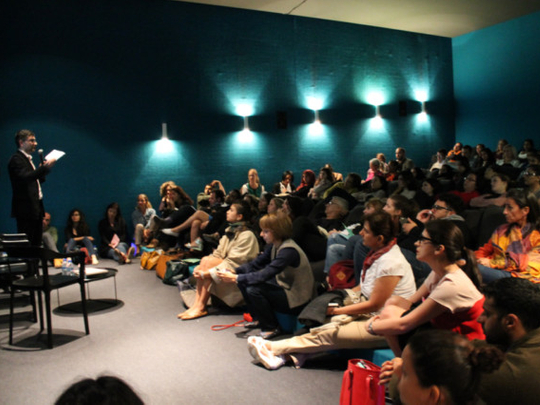
The ninth edition of Art Dubai will be held at Madinat Jumeirah from March 18 to March 21, 2015. But the buzz has already begun with registration now open for the third iteration of Campus Art Dubai (CAD 3.0), the art fair’s educational programme for UAE-based art enthusiasts and professionals. CAD 3.0 begins in October and will culminate in March at Art Dubai 2015.
“CAD is the only alternative art school of its kind in the GCC region. It features seminars, workshops, critiques and one-on-one mentorship conducted by established local and international academics, critics, curators and artists, and provides participants with a space for critical thinking and exchange of ideas and skills through collaboration, debate and challenge. Held in partnership with Dubai Culture and d3 Dubai Design District, and hosted by A4 Space in Alserkal Avenue Arts District, it is a key part of Art Dubai’s diverse non-commercial programme. We aim to engage a wide spectrum of the art community through two levels of membership – CAD Community and CAD Core,” CAD coordinator Lee Xie says.
CAD Community is open to art students, artists, writers, curators, designers, architects, art workers, cultural producers and art enthusiasts. The programme begins on October 18, and participants will be invited to attend free monthly community events, lectures and talks, as well as practical skills workshops held every quarter. Applications to CAD community are open on a rolling basis throughout the six month programme, and participants can opt to attend only the events and workshops they are interested in. Whereas, CAD Core is an intensive course designed for graduates and practicing artists looking to enhance their skills.
Participants must commit to attending bi-monthly all day sessions on alternating Saturdays, which include group critiques, lectures, workshops and one-on-one mentorship. Applications for this highly competitive programme must be submitted by August 31.
“Since all those who have participated in the two previous iterations of CAD are automatically enrolled to the Community programme, the CAD Community now has over 200 members and is growing every year. This part of the programme is essentially geared towards providing UAE-based art practitioners with a historical context in which to situate their work as well as hands-on knowledge through skills-based workshops. For our Core course, we usually admit around 15 participants per iteration. This not only ensures that each participant has ample time and access to visiting tutors but also allows us the mobility to take the group for openings, field visits and other events. We also try to select a varied group so that members are exposed to different schools of thought and different kinds of art practices,” Xie says.
This year CAD is focused on the recent past and the contemporary condition of the GCC, reflecting on issues of contemporality and modes of productivity, both artistic and otherwise with special attention to how the construction and memory of heritage affects the making, framing, delivery, circulation and viewing of images from the UAE.
The monthly lectures, which are open to the public, will focus on Arab and GCC art history, by speakers such as well-known art historian and curator Dr Salwa Mikdadi.
The CAD Core programme will be led by well-known art critic, curator and editor Murtaza Vali, who is a visiting instructor at Pratt Institute, Brooklyn, USA; and anthropologist Uzma Z. Rizvi, who is an assistant professor at the Pratt Institute of Art and Design, teaching subjects such as critical heritage studies, memory and war/trauma studies and art and social change.
“The theme of this programme is ‘On being slow: Time, attention and the construction of heritage’. As a condition of resistance, “being slow” can be read as anti-colonial, anti-imperial. Slow stands in the face of the now default fast-ness and 24/7-ness required by modernity, progress and capitalist achievement. ‘On being slow’ interrogates the place of food (fast food), sleep (lack of sleep as indicative of greater efficiency and achievement) and movement (fast pace) in an effort to contextualise cultural practices that emerge from deep engagements with geographies, localities and people,” Vali says.
During the intensive six-month Core programme, the participants will attend lectures, seminars and hands-on workshops conducted by visiting professionals, and have one-on-one advisory sessions with the tutors. They will have access to the facilities at Dubai-based art organisation Tashkeel to help them develop their own projects; and they will get opportunities to present their work for group critiques. Other benefits include opportunities to apply for residencies, fellowships and curatorial roles at Art Dubai’s partner institutions; and the chance to showcase their work during Art Week in March 2015.
CAD Core group members will also work on a group project for Art Dubai 2015. “The first edition of CAD culminated in a series of exhibitions across Dubai and Sharjah, curated by participants and featuring the work of participating artists. Last year the participants of the Core class conceived, authored, edited and designed a collaborative limited edition book of recipes, ‘Campus Art Dubai: Served’. This year the participants will be challenged to make podcasts, interviews, readings, performances and field recordings based on the CAD 3.0 theme for Art Dubai 2015’s Radio station, which will broadcast at the fair as well as online,” Xie says.
For more information and registration visit www.artdubai.ae


